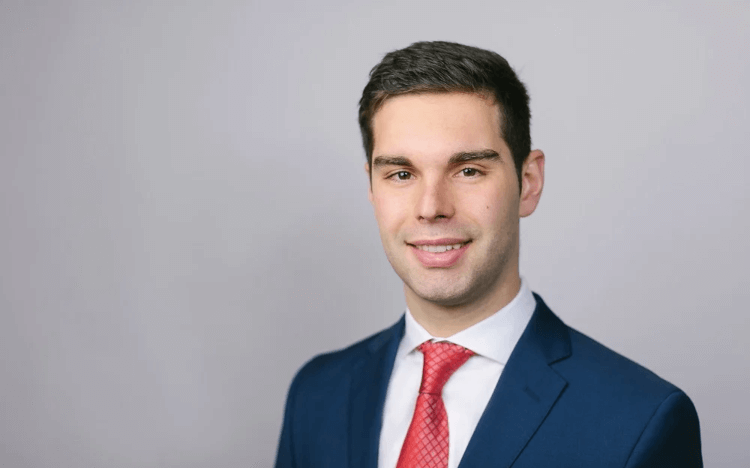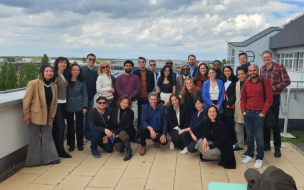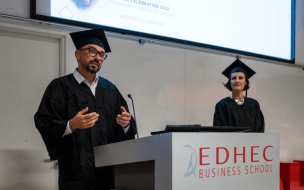Raised in a small Austrian town near Vienna, Paul studied his bachelor’s degree in international business administration. Alongside his studies, he also undertook part-time internships with the likes of Raiffeisen—Austria’s largest bank.
The experience provided the foundation for a career in finance, but Paul later decided a graduate business degree would strengthen his profile and open opportunities in the financial markets.
In 2019, he enrolled in a dual degree in management and financial engineering at EDHEC Business School. Now, two years since graduating, he is a portfolio manager with a highly quantitative asset management fund.
Why EDHEC Business School?
When searching for a business school, Paul was keen to choose one that offered a highly technical, finance Master’s degree.
He was aware of EDHEC’s strong reputation in the financial industry. The school also ranks highly in business school rankings—the MSc in Financial Engineering (formerly MSc in Financial Markets) is ranked fifth worldwide by the Financial Times.
The Master in Financial Engineering offers a highly technical curriculum including modules covering subjects such as advanced fixed income, machine learning, and advanced derivatives.
“It was the only program that I found that was really tailored towards the quantitative side,” Paul explains.
He was also impressed by the quality of the professors who taught on the program.
“EDHEC had a lot of professors who were formerly doing PhDs in Ivy League universities,” he says. “You had a lot of experts doing research in quantitative finance there, and these experts were also teaching classes.”
What’s it like to study a highly quantitative finance MSc?
The EDHEC MSc in Financial Engineering is aimed at students with quant-heavy backgrounds. More than 85% of students studied their previous degrees in finance or economics.
The MSc curriculum focuses on in-depth financial skills. Modules include subjects like asset pricing and financial modelling, while you also learn coding and machine learning skills. Concentration periods allow you to delve deeper into these subjects.
As one of the world’s top-ranked finance degrees, the MSc in Financial Engineering is highly competitive, however Paul was struck by an immediate sense of community among his cohort.
The curriculum involves a variety of group projects and games designed to promote teamwork. This helped students build connections within the cohort, he says. “We were graded relatively to each other, but people were still very collaborative and friendly.”
Beyond the core knowledge and skills he gained, studying the MSc also gave Paul exposure to leading figures in the financial industry during guest lectures and modules delivered by external speakers.
He was taught by a former board member from the US investment management firm PIMCO. He also had sessions with the director of the EDHEC risk institute, an investment center providing practicable research for investors.
This broad range of experiences gave him the skills, connections, and confidence to launch his career after graduation.
Launching a career in portfolio management
Paul’s career in portfolio management began midway through his Master’s degree, when he landed an interview for a summer internship with ConvertInvest through an EDHEC classmate.
He was able to secure the role after impressing recruiters: “I already knew the answers to all the technical questions they were asking me because I had the knowledge,” he explains.
“I [also] had the confidence to talk about these topics, I think that was important.”
Paul spent six months at ConvertInvest as an intern before leaving to undertake an internship within Scientific Beta, the financial index platform launched by EDHEC’s risk institute in 2001. He returned to ConvertInvest in early 2022 in a full-time position.
Today, Paul’s role requires him to use complex financial theories to make practical investment decisions for ConvertInvest clients. This means he regularly implements quantitative programming strategies, while also developing financial tools.
The intense environment requires him to quickly react to changes in the market. “Every day there’s a flood of information and you need to process it efficiently,” he says.
The role makes use of his in-depth knowledge of financial theories, however Paul maintains that the ability to think critically when taking decisions is his most crucial skill.
“One very important thing that EDHEC teaches is to think critically about data analysis, you need to separate the real information from the noise,” he explains.
“If I find out something, I can make my own mind up about it and think critically. I think for myself, and that’s what the Master’s at EDHEC promotes.”








